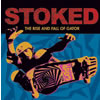STOKED: The Rise and Fall of Gator
–2003, Helen Stickler
Stoked opens with Mark “Gator” Rogowski, at the height of his popularity, talking about his desire to beat fear. He comes off like a self-assured, happy kid. And why shouldn’t he? He’s young, has a beautiful girlfriend, a huge house, and gets paid more than most people see in a year in one month from sales of his signature skateboard alone. Not to mention, he’s got all of this because of skateboarding, something he loves to do.
Then, in 1991, Gator confessed to the rape and murder of a 20-year-old girl. He was 24.
This documentary does more than just tell the story of Gator. It tells the story of skateboarding in the ’80s, when swimming pools and vert ramps ruled and a bunch of teenagers made more money than they knew what to do with for doing something most kids only got in trouble for doing. Some of them, like Tony Hawk, managed to avoid the pitfalls of the time and make a serious career for themselves. Others, like Gator, ended up in prison or worse.
Stickler doesn’t mean to say that skateboarding made Gator a killer. She does, however, examine the effects of commercialization on something that is less a sport than a “combination between artistic expression and athleticism,” as one of the skaters says. That skateboarding is so personal, much more so than team sports, makes it that much more difficult to seperate it from life, and that much harder to deal when the fame starts to wane. Stickler doesn’t cover Gator’s family life or other factors that could have contributed to what he became, but she does an excellent job of showing the skateboard scene of the time, and how the money and fleeting nature of fame could affect these kids, who had no one to teach them how to deal with it. Gator may be an extreme example, but coping with the pressures of fame is not a new problem in these times (Kurt Cobain, anyone?).

